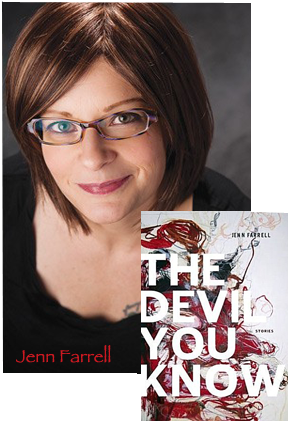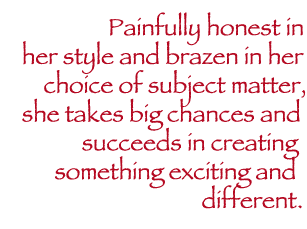
 I discovered The Devil You Know one sunny winter
afternoon while riding the ferry across Georgia Strait from Vancouver to Victoria. While flipping through
a rather dull local newspaper, a glowing review of this short story collection jumped out at me. I had
never heard of Jenn Farrell, but the article promised that she was a compelling writer and a fresh talent
on the Canadian literary scene. With both high hopes and mild trepidation, I tracked down a copy and was
delighted when Farrell's writing exceeded my expectations. She did this by not playing it safe. Painfully
honest in her style and brazen in her choice of subject matter, she takes big chances and succeeds in
creating something exciting and different.
I discovered The Devil You Know one sunny winter
afternoon while riding the ferry across Georgia Strait from Vancouver to Victoria. While flipping through
a rather dull local newspaper, a glowing review of this short story collection jumped out at me. I had
never heard of Jenn Farrell, but the article promised that she was a compelling writer and a fresh talent
on the Canadian literary scene. With both high hopes and mild trepidation, I tracked down a copy and was
delighted when Farrell's writing exceeded my expectations. She did this by not playing it safe. Painfully
honest in her style and brazen in her choice of subject matter, she takes big chances and succeeds in
creating something exciting and different.
Each of the nine stories centres on one or more young women, and each tells a story that may be funny, but is never pretty. This is a style of fiction that I call "grit-lit": raw, revealing, and well, yes, gritty. The Devil You Know is full of stories about the dark side of life that many readers would rather forget exists. They are authentic, intense, astute and powerful. These teens and twenty-somethings use poor judgment, drink too much and have sex with the wrong men. Although some of the characters are unsavoury, and the events are cringe-worthy, these young women are not bad people. Instead, they all suffer from a lack of guidance and direction, and I get the impression that they'll all pull themselves together eventually. In one story, Farrell asks: "Now let's just suppose that not all of these girls are real. What if I had made some of them up? Would you be able to tell the difference? Would it matter?"
In "Tested," a teenage girl takes a pregnancy test in a public toilet stall at a donut shop. Most of the story happens while she"s waiting for the results. During the three minutes, we hear her stream of consciousness thoughts on how to tell her parents (if) she's pregnant, her mother's miscarriages, her boyfriend, her excuses for not using birth control, abortion, giving birth at the prom, parenting, and the history of the pregnancy test, among other things. Both the details and voice are pitch perfect.
 "Communion" takes place on a Christmas Day, when roommates Emily and Carrie, newly arrived from Ontario,
decide to hang out in downtown Victoria. Dressed up like "poor, slutty versions of the girls who worked at
Santa's workshop in the mall," the two do some magic mushrooms, ride their bikes, smoke cigarettes at the
water's edge, have Christmas dinner at Denny's and finally go to church.
"Communion" takes place on a Christmas Day, when roommates Emily and Carrie, newly arrived from Ontario,
decide to hang out in downtown Victoria. Dressed up like "poor, slutty versions of the girls who worked at
Santa's workshop in the mall," the two do some magic mushrooms, ride their bikes, smoke cigarettes at the
water's edge, have Christmas dinner at Denny's and finally go to church.
Probably the strongest story in the batch is "Grimsby Girls." Each of these fourteen vignettes is an interviewee's response to questions about her first sexual encounter. The accounts show a vast range of experiences—although we all wish that first time would be "like an Olivia Newton-John song on a warm summer afternoon," that is rarely the case. Some of the portraits made me wince, and even the non-seedy episodes had an air of melancholy, but they all seemed to be saying "that even when it's not magical,… everything will be okay."
The only story told from a male point of view is "Pen Pal." In just two pages, we see the narrator's adoration of a teenage bully who has been convicted of brutally murdering another girl. Dismissing the seriousness of her heinous crime, he is instead tantalized by it and glamorizes her. He thinks about "those sunny days when she'd walk into the courthouse wearing her cream-coloured sweater and her shiny brown hair would fan out behind her. Like a wind machine was blowing. Cameras going off all around her like she was a movie star." I found this story extremely disturbing because, although no names are given, the murderer is clearly Kelly Ellard, one of the most hated criminals in Canadian culture.
 There appears to be a purposeful order to the stories here that is designed to capture the reader's emotions
and build toward a thunderous finish. The book starts with the restrained "Day of the Dead" in which a lonely,
pragmatic hair stylist makes arrangements for her estranged mother's funeral, and ends with the walloping
"Soft Limits." This story begins "I've been a liar all my life. Not just typical childish lies to avoid
the consequences of my actions, but elaborate fabrications of my imagination, often based on a story of
personal victimization." After a few illustrations of her pathetic attempts to grab attention by shocking
people, the anonymous narrator is swept up into a new life with Troy, who introduces her to BDSM (bondage
& discipline, domination & submission, and sadism & masochism). As his "submissive," she goes down a path
of ever-increasingly unconventional sexual behaviour. Eventually she snaps out of it and when she reflects
on the woman she was, says "I do not recognize her at all." It is important to keep in mind, however, that
at the beginning of the tale she warns us that "the habit of lying for the purposes of a good story has
never left me … fabrications made in the moment are consistently more interesting than the truth," and
also, "what is certain is that have grown increasingly disconnected from the world around me … my entire
identity is a construct." Like the people she tells her tales to, I too was momentarily caught up in her
plight. But rather than being a story about surviving sexual deviancy and maturing into a stable individual,
I believe the narrator made up the whole thing, as some form of literary Munchausen syndrome.
There appears to be a purposeful order to the stories here that is designed to capture the reader's emotions
and build toward a thunderous finish. The book starts with the restrained "Day of the Dead" in which a lonely,
pragmatic hair stylist makes arrangements for her estranged mother's funeral, and ends with the walloping
"Soft Limits." This story begins "I've been a liar all my life. Not just typical childish lies to avoid
the consequences of my actions, but elaborate fabrications of my imagination, often based on a story of
personal victimization." After a few illustrations of her pathetic attempts to grab attention by shocking
people, the anonymous narrator is swept up into a new life with Troy, who introduces her to BDSM (bondage
& discipline, domination & submission, and sadism & masochism). As his "submissive," she goes down a path
of ever-increasingly unconventional sexual behaviour. Eventually she snaps out of it and when she reflects
on the woman she was, says "I do not recognize her at all." It is important to keep in mind, however, that
at the beginning of the tale she warns us that "the habit of lying for the purposes of a good story has
never left me … fabrications made in the moment are consistently more interesting than the truth," and
also, "what is certain is that have grown increasingly disconnected from the world around me … my entire
identity is a construct." Like the people she tells her tales to, I too was momentarily caught up in her
plight. But rather than being a story about surviving sexual deviancy and maturing into a stable individual,
I believe the narrator made up the whole thing, as some form of literary Munchausen syndrome.
Some readers will find The Devil You Know too distasteful with its fuzzy morality and unflinching look at life.
I admit that at times I wondered how Farrell's twisted mind worked. If, on the other hand, you appreciate a
writer who is a sharp observer and gets the details right, over and over again, you too might be riveted by
The Devil You Know. Farrell spoiled me for other writing that isn't as real. Her gift of verisimilitude is
so exact that more than once I caught myself thinking: "there but for the grace of god go I."

Joyce Nickel is a corporate writer from Vancouver, Canada, and a founding member Belletrista's Board of Advisors. When she's not reading or traveling, she can be
found enjoying the outdoor lifestyle of the Pacific Northwest.